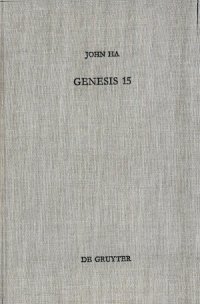
Ebook: Genesis 15: A Theological Compendium of Pentateuchal History
Author: John Ha
- Genre: Religion
- Tags: Old Testament Other Religions Religious History Studies Religion Spirituality
- Series: Beihefte zur Zeitschrift für die alttestamentliche Wissenschaft 181
- Year: 1989
- Publisher: Walter de Gruyter
- Language: English
- pdf
This book is a slightly revised edition of Ha’s doctoral dissertation under J. A. Soggin, defended at the Pontifical Biblical Institute, Rome. This refreshing study of Gen 15 is not only an important contribution to the understanding of this chapter, but also to Pentateuchal research in general and, therefore, highly recommended.
Part one studies the unity of Gen 15 and the prophetic influence. Ha offers his own translation o f this text whose difficulties are well known. For the ובן משק ביתי in v. 2, Ha follows L. A. Snijders and translates “and the usurper of my house—he is a Damascene—is Eliezer.” The hostile character of Eliezer may become a problem in Gen 24:2, but Ha solves it nicely (pp. 19-22). He does not consider חשׁכה in v. 12b a gloss and translates “the fear of a great darkness fell upon him" (p. 25). Ha lists all the problems of Gen 15 such as doublets and discrepancies which have raised the problem of the tradition-history and the literary sources of the chapter for many years. Ha summarizes all the given solutions, and as one might expect in a dissertation, he tries to be exhaustive. He gives a two page table, starting with Gunkel, Skinner, Smend, etc. and running to De Pury, Zimmerli, and Anbar. The table indicates that the source-analysts agree on only a very few verses and that the remaining verses have been attributed by different scholars to different sources. A few scholars, however, treat Gen 15 as a literary unit. How the work of Van Seters can be called “structural analysis” (p. 3) is a mystery.
Part one studies the unity of Gen 15 and the prophetic influence. Ha offers his own translation o f this text whose difficulties are well known. For the ובן משק ביתי in v. 2, Ha follows L. A. Snijders and translates “and the usurper of my house—he is a Damascene—is Eliezer.” The hostile character of Eliezer may become a problem in Gen 24:2, but Ha solves it nicely (pp. 19-22). He does not consider חשׁכה in v. 12b a gloss and translates “the fear of a great darkness fell upon him" (p. 25). Ha lists all the problems of Gen 15 such as doublets and discrepancies which have raised the problem of the tradition-history and the literary sources of the chapter for many years. Ha summarizes all the given solutions, and as one might expect in a dissertation, he tries to be exhaustive. He gives a two page table, starting with Gunkel, Skinner, Smend, etc. and running to De Pury, Zimmerli, and Anbar. The table indicates that the source-analysts agree on only a very few verses and that the remaining verses have been attributed by different scholars to different sources. A few scholars, however, treat Gen 15 as a literary unit. How the work of Van Seters can be called “structural analysis” (p. 3) is a mystery.
Download the book Genesis 15: A Theological Compendium of Pentateuchal History for free or read online
Continue reading on any device:

Last viewed books
Related books
{related-news}
Comments (0)